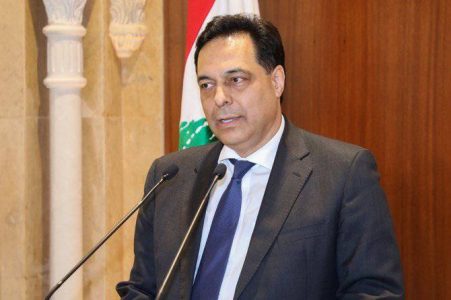
Hezbollah-designated prime minister a recipe for increased unrest
Protests in Lebanon continued after the nomination of Hassan Diab, a Sunni former education minister, to be the country’s new prime minister.
His designation by Lebanese President Michel Aoun was contested by protesters and the Sunni community, many of whom continue to insist their demands for an independent prime minister who was never part of a government be upheld.
Diab, who has worked as the American University of Beirut’s (AUB) vice president for regional external programsand as a professor of electricalengineering, was an education minister in the Nagib Mikati government in 2011, which was formed by Hezbollah and the Aounist party after they organized the downfall of Saad Hariri’s government.
Diab boasted in his 134-page bio about “international and national institutions having recognized my achievements as outstanding contributions to the field of education.” He also wrote in his CV: “I was the only AUB professor administrator in the history of AUB to become (a) minister.” Presumably he was unaware of the existence of late writer and journalist Ghassan Tueini, Bassel Fuleihan, who was assassinated alongside late Prime Minister Rafik Hariri, or Ghassan Salame and Jihad Azour, all of whom were both ministers and AUB professors.
His quick designation by Aoun after Hariri refused to head a technocrat government of national unity was the outcome of a brokered deal between Hezbollah and the president’s son in law, Gebran Bassil. Only six Sunni deputies designated him, all close to Hezbollah and Syrian regime allies. Sunni supporters of Hariri, though, took to the streets and protested violently at the nomination.
Despite calls from Hariri himself for protestors to stand down, the demonstrations turned ugly, and in some cases violent, with the security services targeted by the mob. Many protesters appeared in front of the heavily guarded residence of the new prime minister — demanding an independent prime minister instead. During the parliamentary consultations with various parties, Diab said he would need six to eight weeks to form a government of 20 independent specialists. Many, though, simply do not trust him to follow through when backed by Aoun and Hezbollah.
Hariri’s party, the Future Movement, has said it will not participate in his government. The Lebanese Forces Party headed by Samir Geagea said the same thing. The socialists, headed by Walid Joumblatt, designated former Lebanese Ambassador to the UN Nawaf Salam instead.
It has created a recipe for future confrontation, with Salam a highly respected independent personality who belongs to a prominent Sunni family of politicians (his late uncle, Saeb, and cousinTammam Salam, both held the office of prime minister). Hezbollah has claimed Nawaf is supported by the US — an assertion many flat out refuse to accept as anything other than a smear.
With the ongoing protests in various cities across Lebanon and with Aoun, Bassil and Hezbollah frustrated, the forming of a government by Diab is going to be near impossible. He will not be able to satisfy the people’s demands, nor those of major foreign powers who pledged in Paris under the chairmanship of France to support Lebanon if and when a credible efficient government is formed.
US Undersecretary of State for Political Affairs David Hale visited Beirut last week, to stress the same message. But the question is, how credible can a government tailored by this trio be, having failed since 2011 to supply even basic services?
After nearly a decade of failure, Lebanon is on the brink of collapse. It needs international support badly — and Diab’s appointment, failing to unite the country, will not lead to that.
Source: Arab News





